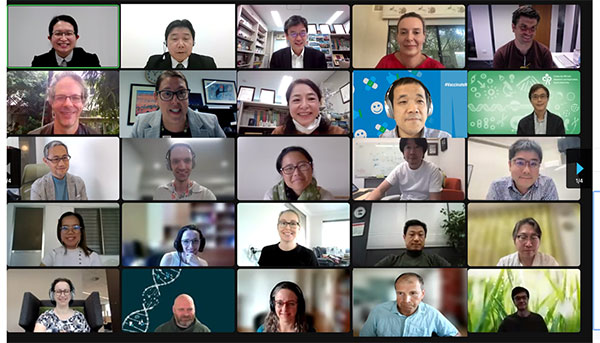News & Topics
Future Trends and Emerging Technologies in Synthetic Biology Workshop
Asia and Pacific Research Center
https://www.jst.go.jp/aprc/en/index.html
Department of International Affairs
As part of JST’s efforts to promote collaboration between Australia and Japan, the Future Trends and Emerging Technologies in Synthetic Biology Workshop was co-organized by the Asia and Pacific Research Center (APRC) of JST, the Ministry of Education, Culture, Sports, Science and Technology (MEXT), the Department of Industry, Science, Energy and Resources (DISER) of Australia, Commonwealth Scientific and Industrial Research Organisation (CSIRO), and the Australian Embassy Tokyo on March 16, 2022, at the JST Headquarters No 2. building.
With advances in biotechnology and computational power, the world has entered the era of synthetic biology which is an exciting emerging field of science. In this workshop, 2 co-chairs and 14 speakers from universities/institutions in both countries working on cutting edge technologies, as well as over 150 participants shared their research and the latest news from this exciting new field.
The opening remarks of the workshop were given by governmental representatives of both countries, Ms. Steph Gorecki Natik of DISER, Australia, and Mr. Hiroya Yamanouchi of MEXT, Japan, and condolences were given to those affected by the recent flooding across Queensland and New South Wales, Australia. The morning session was promptly started by the Japanese co-chair, Prof. Akihiko Kondo, Vice President of Kobe University. Prof. Aleksandra Filipovska, Deputy Director of the Australian Research Council Centre (ARC) of Excellence in Synthetic Biology at the University of Western Australia gave the first keynote speech of the day, and introduced her research on Synthetic medicinal biology, covering mitochondrial editing tools and their associated medical applications.
Following this the morning session of the workshop started, chaired by Prof. Kondo. This began with Session A, focusing on artificial cell construction and basic technology in synthetic biology. Professors Yuki Goto and Hirohide Saito represented Japan and introduced their research on artificial synthesis of modified peptides and synthetic RNA technology, respectively. Prof. Wenlong Cheng of Monash University in Australia then gave a presentation on gold nanowire and its applications in wearable electronics. Session A was finished up with a presentation by Prof. Ian Paulsen on the work done by the ARC Centre of Excellence in Synthetic Biology at Macquarie University, their achievements and goals, and their plans for the future.
Session B then began, looking at systems biology and protein translation systems. Dr. Yutetsu Kuruma of the Tokyo Institute of Technology started by introducing his research on artificial cells, organelles and the development of functions unique to these structures. Prof. Kirill Alexandrov joined the workshop from Queensland University of Technology and spoke about creating ‘logic circuits’ in the cell using ligands and related applications. This was followed by Prof. Colin Jackson of Australian National University who covered artificial proteins, protein evolution and the creation of a molecular fossil record. The session was closed by Dr. Nozomu Yachie, who joined the workshop from the University of British Columbia in Canada. He spoke about his work on developing DNA event recording and developments in the real time recording of cell division and related processes.
After a short lunch break the afternoon session started, and was chaired by Prof. Claudia Vickers, Chief Scientific Officer of Provectus Algae and the former Director of CSIRO’s Synthetic Biology Future Science Platform, Australia. The session started with the second keynote speech, done by Prof. Hiroyuki Noji from the University of Tokyo. He covered research on artificial cell reactor technology and on chip, cell-free systems. This led to session C, where applications of synthetic biology were covered. Prof. Keiji Nishida, the Deputy Director at the Research Center for Advanced Bioengineering, Kobe University covered the development and application of base editing technologies. The next presenter was Prof. Toshiya Muranaka of Osaka University, who spoke of the potential development of medicinal properties in plants using synthetic biology. Dr. Colin Scott, the Synthetic Biology Future Science Platform Director, CSIRO then presented research on the use of artificial metabolic pathways in continuous-flow reactors. Co-chair Prof. Vickers gave the final presentation on her work involving synthetic biology tools used to understand and control subcellular biocatalysis conditions.
The workshop finished up with 3 discussion sessions held on various aspects of synthetic biology. Group 1 discussed Metabolic engineering, systems biology and modeling and data science and bioinformatics, Group 2 covered Artificial cells and genome engineering, and synthetic biology tools and nanotechnology, and Group 3 took a look at Bio-products and biomaterials, cell-free systems, protein engineering and biocatalysis. Experts in similar research fields had a chance to have a shared discussion, focusing on how to promote collaboration between Australia and Japan, as well as with students looking to become involved in biology, and a lively exchange ensued.
The workshop closed with each group sharing their discussion points with all participants and the final wrap up was done by the co-chairs. Many cutting-edge technologies, concepts and ideas related to synthetic biology were exchanged during the workshop and the seeds of collaboration began to sprout through the exchange of contact information and research ideas between the participants. The co-chairs gave comments at the conclusion of the meeting, saying “For synthetic biologists this has been a great meeting! Many excellent talks!” A small survey was taken at the end of the workshop, and over 65% of attendees evaluated the workshop as excellent, 35% as good, and 58% said that they found ideas for collaboration. The APRC excitedly looks forward to future collaboration between Japan and Australia and seeing the outcomes of the networking at the workshop.
Workshop Program: https://www.jst.go.jp/aprc/en/event/2022ausjp.html

